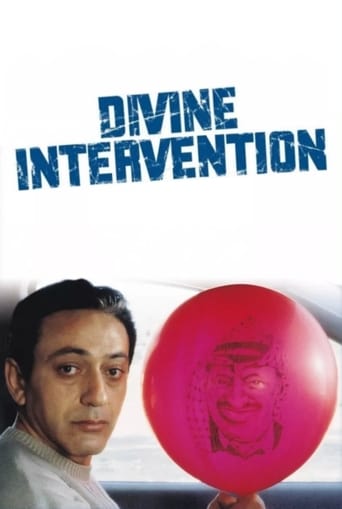Benedict_Cumberbatch
I would be lying if I said I loved this film. However, writer-director-actor Elia Suleiman created a pretty unique, bizarre allegory of tolerance in Palestine that deserves at least one viewing."Divine Intervention" is composed of a circle of vignettes that vary from "Father Feels Sick" to "I Am Crazy Because I Love You". Using minimalist settings, economic dialogue and bizarre, surreal situations that involve a dying Santa Claus and a female ninja, Elia creates a mosaic of apparently disconnected types and caricatures. His "message" is illustrated in a not so subtle metaphor by the last scene. Even though "Divine Intervention" doesn't always succeed, Suleiman deserves special mention for daring to experiment in a way that most filmmakers are afraid to. Not a bad thing to do. 7/10.
mich_new
a beautifully shot, well thought-through film about the despair of life in the Palestine territories. the arrows of blame are pointing to all directions, making it a complex statement of a dead-end situation.this is a film about life cut off by barriers- physical, psychological, communicational and political- between countries people, lovers and neighbors. and about the yearning to brake through them.through a complex critique of both sides of the conflict, the viewer is turned into a silent witness of oppression corruption and decay.it's visual far exceeding previous films originating palestine or israel, each frame is an artwork, symbolic and poetic. a cinematographic pearl. a must-see.
Leandro_cba
Divine intervention breaks the rules in many ways, only in order to make an incredibly strong political statement. It breaks the conventions imparted by the establishment of Hollywood and his lambs all around the world (just here, in Cordoba, the second city of Argentina, Hoyts Cinemas has inverted 24 million dollars). The convention of how a third world film has to be. The convention that says that third world films must be compromised films with the social reality in a way that is appealing for a first world "qualite" audience. It also breaks the rules imparted by the filmmakers of the same group of countries that Elia Suleiman about how a compromised director and his works should be. Besides, the film appropiates the resources of the powerful (the magnificent scene with the Ninja Fighter girl) to subvert, trough parody.By the way, dont miss the Buster Keaton hommage by Suleiman himself.
dangerbirdny
Never have I seen a film with so much potential fizzle so steadily, like an inflated (Arafat) balloon with a slow leak. While some individual scenes (e.g. snake) resonated well, the rest of the movie descended into the mire of symbolic paradody for its own sake. And who wants to watch that? The main problem with the film was the unbounded satire. All the characters (with the possible exception of the filmmaker himself) are so ridiculous, that one doubts whether the movie has anything important to say about anything real at all. Yeah, yeah, we know how 'silly' the whole 'situation' is. But do we really need a cast of evil, clownish Israelis and a whole lot of short-sightend, self-depreciating, Palestinian simpletons (again with the exception of the filmmaker and his erstwhile heroine) to tell us this? Satirical stereotyping we have enough of; sophisticated art that actually has something to say is in much shorter supply. And still is.


